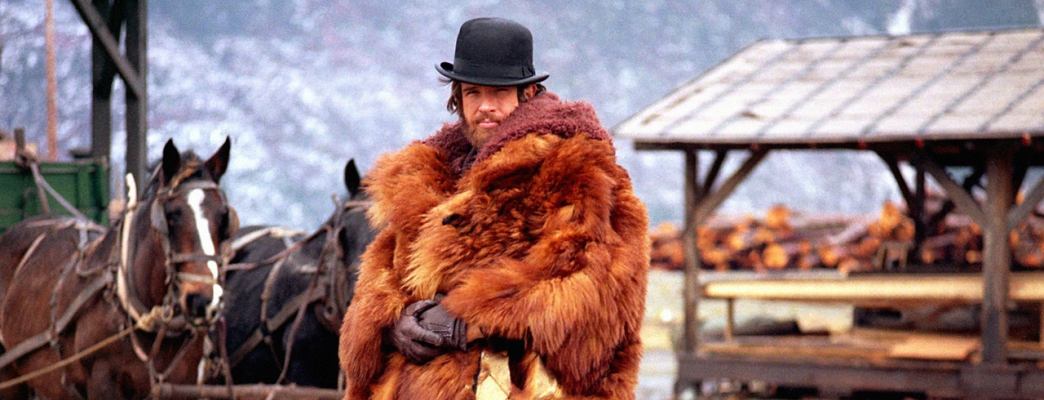Or how the West was sold.
CONTAINS SPOILERS, INCLUDING THE ENDING OF THE FILM
Robert Altman’s 1971 “anti-Western” is a gently ironic paean to the gentle charms of the more civilised frontier and a salutary lesson about the dangers of unchecked capitalism.
The rainy, wooded, Pacific Northwest setting of McCabe & Mrs. Miller, introduced to the strains of Leonard Cohen’s Stranger Song, feels a world away from the epic, sun-bleached Old West of John Ford or Sergio Leone. Our protagonist, too, John “Pudgy” McCabe (Warren Beatty) is less laconic and certainly less bloodthirsty than his predecessors. He’s more inclined to reach for a folksy homily than a revolver.
When McCabe arrives in the small mining town of Presbyterian Church, it’s with the intention of setting up a brothel to cater for local miners. He sets about his business bluntly, but with a certain winsome charm, and quickly wins over the townspeople. The situation is complicated by the arrival of Mrs. Miller (Julie Christie), a Cockney madam with ambitions of turning McCabe’s cheap and cheerful operation into a high-class establishment.
Both Beatty and Christie, then in a relationship, play against type – Beatty burying his movie star charisma beneath a bushy beardy, Christie as an aspiring Eliza Dolittle.
Altman’s misty-eyed cinematography – he and cinematographer Vilmos Zsigmond pre-fogged the film’s negative – and eclectic supporting cast, with characteristic use of overlapping dialogue, makes McCabe & Mrs. Miller into a dream of a bygone age.
Rene Auberjoinois plays half-shrewd local saloon owner Sheehan, who tries half-heartedly to match wits with McCabe, with Altman’s frequent collaborator Shelly Duvall brings those sharp yet languid eyes to bear as mail-order bride Ida Coyle, whose arrival in Presbyterian Church is aboard a rambunctious steam engine.
Further “progress” comes in the form of representatives of Harrison Shaughnessy Mining Company, who offer to buy McCabe out. McCabe, thinking himself shrewd, leads them on; banking on a huge payday. It’s only once the representatives depart that McCabe realises he’s overplayed his hand.
Capitalism in the Old West, we discover, is markedly less subtle in its methods than the sophisticated beast into which it’s evolved.
So, McCabe finds himself negotiating futilely with Butler (Hugh Millais, bearing a striking resemblance to Buffalo Bill1, an easygoing stranger newly arrived in town with two sidekicks (Manfred Schulz & Jace Van Der Veen), ostensibly for the purposes of hunting. McCabe knows that Butler is there to kill him, but, try as he might, he can’t reach a deal with the hitman. That, say you might say, is someone else’s department.
Altman presents the business that McCabe and Mrs. Miller have created – well, largely Miller – as a glowing, well-furnished refuge, a place of comfort and companionship for both the employees and the clientele.
Butler and his ilk are interlopers, killers. The young Cowboy (Keith Carradine in his first film role), a gangly, aw-shucks figure of innocence, is shot and killed by then on the barest pretence. Innocence, like refuge, is only temporary.
Having proven his own gunfighter credentials by dispatching all three men, McCabe meets his own end out in the cold, unnoticed; the snow gathering around his body as the villagers are distracted by a fire at the church and Mrs. Miller slips into an opium haze. There is a sense that the film, too, is slipping away and, with it, the age we depicts.
Watching this in the cinema, we know already how this ends – in modernity no less where the world is run by major corporations, cleaner, more efficient, but somehow less honest. McCabe isn’t a hero – he’s a businessperson – but at least he’s that: a person and, ultimately, just a bump in the road from icy wilderness to corporatocracy.
McCabe & Mrs. Miller was seen at the BFI Southbank as part of their superb Robert Altman Season
